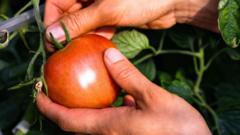A recent inquiry unveiled that several UK supermarket brands label their products as ‘Italian’ while the tomatoes used may be sourced from Xinjiang, China, where forced labor allegations persist. The accuracy of product origin claims has come under scrutiny, prompting serious responses from concerned retailers.
UK Supermarkets Face Allegations Over ‘Italian’ Tomato Products Sourced from China

UK Supermarkets Face Allegations Over ‘Italian’ Tomato Products Sourced from China
Investigations reveal that popular ‘Italian’ tomato purees sold in the UK may contain tomatoes produced in China through forced labor practices involving Uyghurs.
A recent BBC investigation has raised significant concerns regarding the authenticity of ‘Italian’ tomato purees sold at UK supermarkets, uncovering evidence that many of these products may contain tomatoes sourced from China, specifically from the Xinjiang region, where forced labor has been reported against Uyghur and other Muslim minorities.
The investigation showed that products, including those labeled as “Italian Tomato Purée” from Tesco and descriptions like “Puréed Italian grown tomatoes” from Asda, may actually be made from tomatoes subject to forced labor practices. Testing commissioned by the BBC World Service identified 17 products likely containing Chinese tomatoes. The Xinjiang region provides one-third of the world’s tomatoes, benefiting from ideal agricultural conditions amid rampant human rights violations.
Reports estimate that more than a million Uyghurs are detained in facilities described by China as “re-education camps.” Many former detainees, including workers who shared their harrowing accounts with the BBC, detail the severe exploitation they encountered while working in tomato fields. These accounts coincide with a 2022 UN report identifying systemic torture and forced labor in Xinjiang.
The investigation utilized comprehensive data analysis to trace the shipping patterns of tomatoes from Xinjiang to Italy, identifying Antonio Petti, a major tomato-processing firm, as a key recipient of these tomatoes. Over 36 million kg of tomato paste was sent to Petti from Xinjiang Guannong between 2020 and 2023, raising further doubts about the integrity of the ‘Italian’ labeling.
64 different tomato purees available in the UK, Germany, and the US were tested against samples from Italy and China to establish the geographic origin of their tomatoes. Although many products appeared to contain genuine Italian tomatoes, lab results indicated that several products, including those produced by Petti, were indeed sourced from China.
In light of these findings, supermarkets have conducted internal investigations disputing the initial allegations and claiming to find no evidence of the inclusion of Chinese tomatoes. Tesco has halted supply of certain products, while Lidl has admitted to using Chinese tomatoes in a limited capacity, prompting further scrutiny of supplier practices.
These allegations underscore an ongoing issue concerning the sourcing and authenticity of food products. As more attention focuses on transparency, issues regarding forced labor in supply chains are likely to dominate conversations within the realm of consumer rights and international trade policies.
As the debate continues, advocates like Chloe Cranston from Anti-Slavery International stress the urgent need for stronger regulations akin to those in the US to prevent European markets from becoming outlets for products made under forced labor conditions. Meanwhile, UK regulations remain criticized for being insufficiently stringent against exploitative sourcing. Dario Dongo, a food lawyer, emphasizes the need for consumers to reflect on the deeper implications of low prices on food products, questioning the true costs and human toll behind them.


















